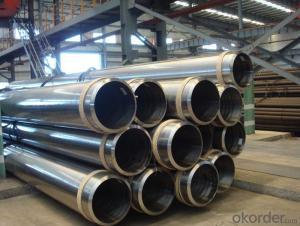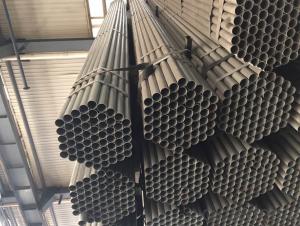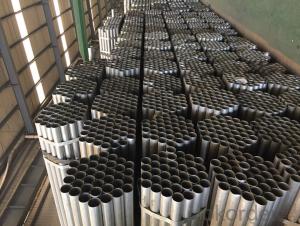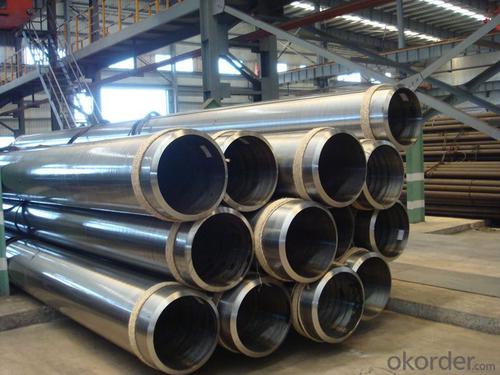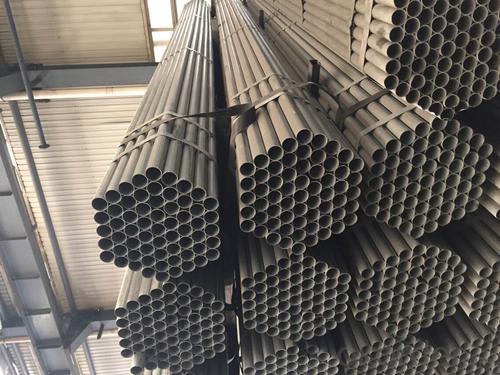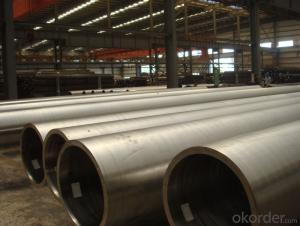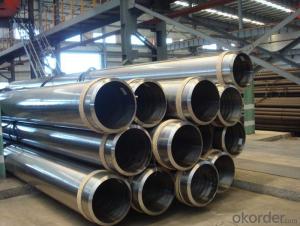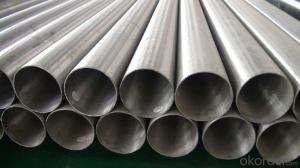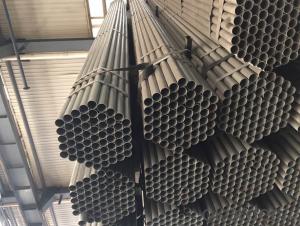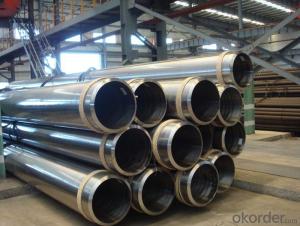Stainless Steel Welded Pipe ASTM A358/A316/A312
- Loading Port:
- Tianjin
- Payment Terms:
- TT or LC
- Min Order Qty:
- 60 m.t.
- Supply Capability:
- 10000 m.t./month
OKorder Service Pledge
OKorder Financial Service
You Might Also Like
1、Structure of Stainless Steel Welded Pipe ASTM A358/A312/A316 Description:
Stainless steel welded pipe is actually a cover term, covering a wide range of alloy and making them suitable for different attributes that are used in a very wide and large numbers of different industries. Stainless steel pipe is resistant to erosion, highly flexible, powerful, easy to use, and can be done in distinct approaches, which means that more and more stainless steel was used as a construction material for large-scale, high impact buildings.
2、Main Features of the Stainless Steel Welded Pipe ASTM A358/A312/A316:
• High manufacturing accuracy
• High strength
• Small inertia resistance
• Strong heat dissipation ability
• Good visual effect
•Reasonable price
3、Stainless Steel Welded Pipe ASTM A358/A312/A316 Images:
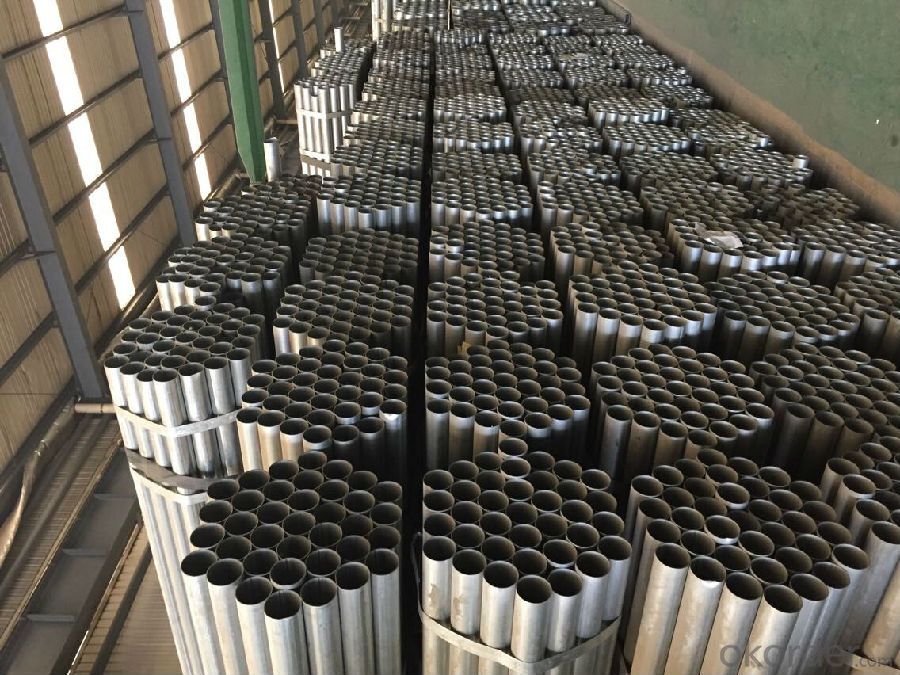
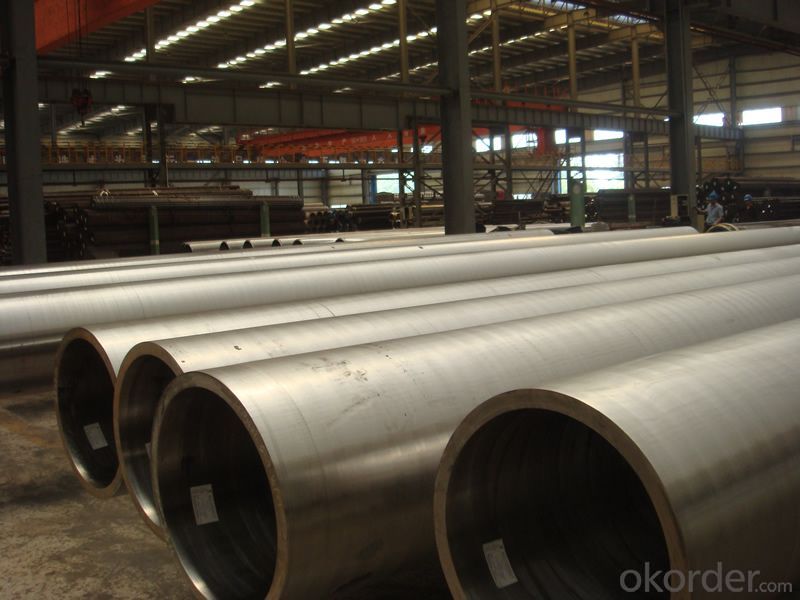
4、Stainless Steel Welded Pipe ASTM A358/A312/A778 Specification:
Size:
| Standard | Outside(mm) | Thickness(mm) | Length(mm) | |
| ASTM A312 | ≤48.26 | -0.4 | +No special provisions(Unspecified)-12.50% | Appoint LengthDefinite cut length+6.40 |
| >48.26~114.30 | 0 | 0 | ||
| >114.30~219.08 | 0.8 | |||
| >219.08~457.20 | 1.6 | |||
| >457~660 | -4 | |||
| >660~864 | -5 | |||
| >864~1219 | -5.6 | |||
Tolerances on dimensions table:
| Outside diameter | Outside | Thickness | ||||
| SCH 5S | SCH 10S | SCH 20S | SCH 40S | |||
| (A) | (B) | mm | mm | mm | mm | mm |
| 350 | 14′ | 355.6 | 3.96 | 4.78 | 7.92 | 11.13 |
| 400 | 16′ | 406.4 | 4.19 | 4.78 | 7.92 | 12.7 |
| 450 | 18′ | 457.2 | 4.19 | 4.78 | 7.92 | 14.27 |
| 500 | 20′ | 508 | 4.78 | 5.54 | 9.53 | 15.09 |
| 550 | 22′ | 558.8 | 4.78 | 5.54 | 9.53 | 15.09 |
| 600 | 24′ | 609.6 | 5.54 | 6.35 | 9.53 | 17.48 |
| 650 | 26′ | 660.4 | 5.54 | 7.92 | 12.7 | 17.48 |
| 700 | 28′ | 711.2 | 5.54 | 7.92 | 12.7 | 17.48 |
| 750 | 30′ | 762 | 6.35 | 7.92 | 12.7 | 17.48 |
| 800 | 32′ | 812.8 | 7.9 | 12.7 | 17.48 | |
| 850 | 34 | 863.6 | 7.92 | 12.7 | 17.48 | |
5、FAQ of Stainless Steel Welded Pipe ASTM A358/A312/A778:
①How is the quality of your products?
Our products are manufactured strictly according to national and internaional standard, and we take a test on every pipe before delivered out. If you want see our quality certifications and all kinds of testing report, please just ask us for it.
Guaranteed: If products’ quality don’t accord to discription as we give or the promise before you place order, we promise 100% refund.
②How about price?
Yes, we are factory and be able to give you lowest price below market one, and we have a policy that “ for saving time and absolutely honest business attitude, we quote as lowest as possible for any customer, and discount can be given according to quantity”,if you like bargain and factory price is not low enough as you think, just don’t waste your time.Please trust the quotation we would give you, it is professional one.
③Why should you chose us?
Chose happens because of quality, then price, We can give you both.Additionally, we can also offer professional products inquiry, products knowledge train(for agents), smooth goods delivery, exellent customer solution proposals.Our service formula: good quality+good price+good service=customer’s trust
SGS test is available, customer inspection before shipping is welcome, third party inspection is no problem.
Any question, pls feel free to contact us !
- Q: What are the different grades of steel pipes?
- There are several grades of steel pipes, including ASTM A53, ASTM A106, and API 5L. These grades vary in terms of their composition, strength, and intended use.
- Q: What is the importance of corrosion resistance in steel pipes?
- The importance of corrosion resistance in steel pipes is significant as it helps to extend the lifespan of the pipes, ensures their structural integrity, and maintains the quality of the fluid or gas being transported. Corrosion can lead to pipe failures, leaks, and contamination of the contents, resulting in costly repairs, environmental hazards, and potential safety risks. Therefore, incorporating corrosion-resistant properties in steel pipes is crucial for their long-term performance, durability, and overall efficiency.
- Q: What is the bending strength of steel pipes?
- The bending strength of steel pipes refers to the ability of a steel pipe to withstand bending forces without breaking or permanently deforming. The bending strength of steel pipes can vary depending on various factors such as the type and grade of steel, the diameter and thickness of the pipe, and the manufacturing process. Steel pipes are known for their high strength and durability, making them suitable for a wide range of applications. The bending strength of steel pipes is typically expressed in terms of the maximum bending moment or the maximum stress that the pipe can withstand without failure. To determine the bending strength of a steel pipe, engineers and manufacturers use various testing methods such as three-point or four-point bending tests. These tests apply a known force or moment to the pipe and measure its deflection or stress response. The bending strength of steel pipes can also be influenced by the pipe's mechanical properties, including yield strength, tensile strength, and elongation. These properties determine the overall strength and ductility of the steel, which play a vital role in its bending strength. It is important to note that the bending strength can vary depending on the specific application and load conditions. For example, pipes used in structural or load-bearing applications may require higher bending strength compared to pipes used for plumbing or conveyance purposes. In summary, the bending strength of steel pipes is determined by various factors such as the type and grade of steel, diameter and thickness of the pipe, and the manufacturing process. Testing methods and mechanical properties are used to evaluate the bending strength of steel pipes, ensuring their suitability for different applications and load conditions.
- Q: How are steel pipes protected against external mechanical damage?
- Various methods are employed to safeguard steel pipes against external mechanical damage. One notable approach involves the utilization of protective coatings, which act as a physical barrier between the steel surface and external forces like impact or abrasion. Coatings can be applied using techniques such as painting, epoxy coating, or wrapping the pipe with materials such as polyethylene or polypropylene. Another means of protection is the application of external casing or encasement. This involves installing casing pipes around the steel pipes to provide an additional layer of defense. These casing pipes are typically composed of resilient materials such as concrete, PVC, or ductile iron, which are resistant to external mechanical damage. Moreover, steel pipes can be safeguarded through the implementation of supports and restraints. Properly designed supports and restraints aid in evenly distributing external forces and preventing excessive stress or deformation on the pipe. This can be achieved by employing hangers, clamps, or brackets to secure the pipe in place and minimize the risk of mechanical damage. Furthermore, protective measures can be employed to prevent accidental impacts or collisions that may harm the steel pipes. This can involve the installation of protective barriers, fencing, or warning signs to alert individuals to the presence of pipelines and prevent inadvertent damage. In conclusion, a combination of protective coatings, casing, supports, and preventive measures are utilized to ensure the protection of steel pipes against external mechanical damage. These measures are crucial in maintaining the structural integrity of the pipes and ensuring their long-term performance and reliability.
- Q: What is the difference between steel pipe and round steel?
- Widely used in the manufacture of structural and mechanical parts, such as oil drilling pipe, automobile transmission shaft, bicycle frame and steel scaffolding used in construction. Making ring parts with steel tubes can improve data application rate, simplify manufacturing process, save data and work hours, such as rolling bearings, rings, Jack sleeves, etc., and have been widely used in steel pipe manufacture.
- Q: Can steel pipes be used for piling?
- Yes, steel pipes can be used for piling. Steel pipes are often used as piles in construction projects due to their strength, durability, and ability to withstand heavy loads. They provide strong support for structures and are commonly used in foundation systems for buildings, bridges, and other infrastructure.
- Q: Can steel pipes be used for sewage systems?
- Yes, steel pipes can be used for sewage systems. Steel pipes are commonly used in sewage systems due to their durability, strength, and resistance to corrosion. They are particularly suitable for high-pressure applications and can withstand the harsh conditions often found in sewage systems. Additionally, steel pipes are relatively easy to install and maintain, making them a popular choice for sewage infrastructure projects.
- Q: Can steel pipes be used for conveying solid materials?
- Yes, steel pipes can be used for conveying solid materials. Steel pipes are commonly used in industries such as construction, oil and gas, and mining to transport solid materials such as ores, coal, grains, and various other solid substances. The durability and strength of steel make it suitable for handling the weight and pressure of solid materials during transportation.
- Q: The plastic pipe and steel pipe difference
- Plastic pipe and plastic inner coating, and coated inside and outside. (of course, some are epoxy coated, and some are PE).The plastic tube is one kind of steel pipe, steel plastic pipe has many types, including plastic, plastic, and plastic coated, and epoxy, which are known are steel tubes.
- Q: Can steel pipes be used for power plant construction?
- Yes, steel pipes can be used for power plant construction. Steel pipes are commonly employed in power plants for various applications such as the transportation of fluids, steam, and gases, as well as for structural support. They offer high strength, durability, and resistance to extreme temperatures and pressures, making them suitable for the demanding conditions found in power plants.
Send your message to us
Stainless Steel Welded Pipe ASTM A358/A316/A312
- Loading Port:
- Tianjin
- Payment Terms:
- TT or LC
- Min Order Qty:
- 60 m.t.
- Supply Capability:
- 10000 m.t./month
OKorder Service Pledge
OKorder Financial Service
Similar products
Hot products
Hot Searches
Related keywords
